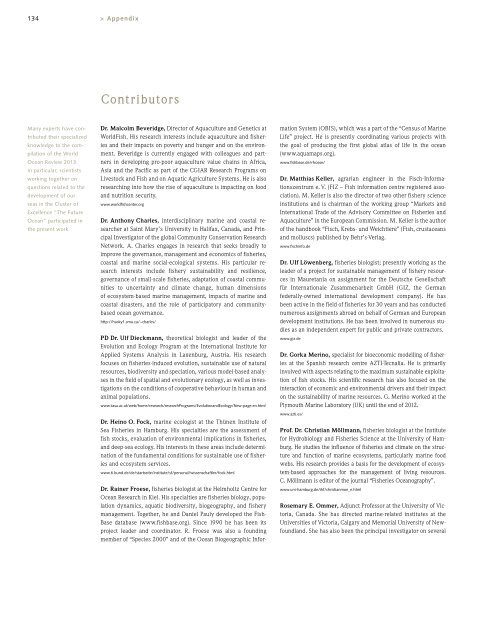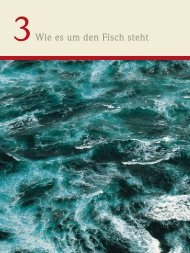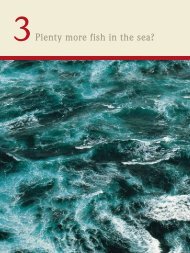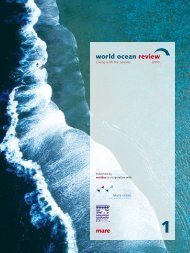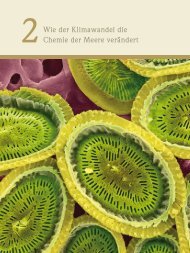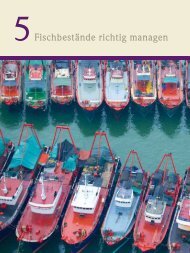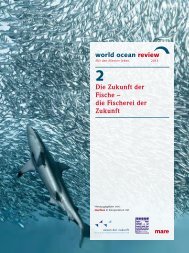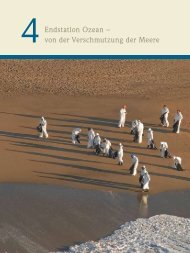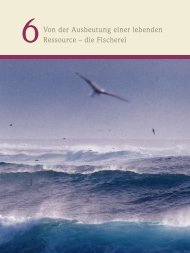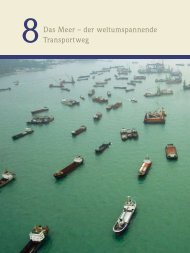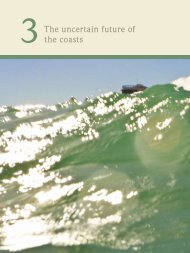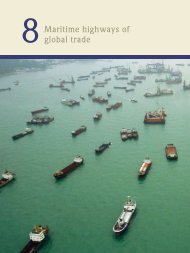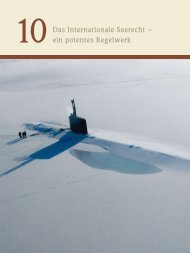Download WOR 2 PDF - World Ocean Review
Download WOR 2 PDF - World Ocean Review
Download WOR 2 PDF - World Ocean Review
You also want an ePaper? Increase the reach of your titles
YUMPU automatically turns print PDFs into web optimized ePapers that Google loves.
134> AppendixContributorsMany experts have contributedtheir specializedknowledge to the compilationof the <strong>World</strong><strong>Ocean</strong> <strong>Review</strong> 2013.In particular, scientistsworking together onquestions related to thedevelopment of ourseas in the Cluster ofExcellence ”The Future<strong>Ocean</strong>” participated inthe present workDr. Malcolm Beveridge, Director of Aquaculture and Genetics at<strong>World</strong>Fish. His research interests include aquaculture and fisheriesand their impacts on poverty and hunger and on the environment.Beveridge is currently engaged with colleagues and partnersin developing pro-poor aquaculture value chains in Africa,Asia and the Pacific as part of the CGIAR Research Programs onLivestock and Fish and on Aquatic Agriculture Systems. He is alsoresearching into how the rise of aquaculture is impacting on foodand nutrition security.www.worldfishcenter.orgDr. Anthony Charles, interdisciplinary marine and coastal researcherat Saint Mary’s University in Halifax, Canada, and PrincipalInvestigator of the global Community Conservation ResearchNetwork. A. Charles engages in research that seeks broadly toimprove the governance, management and economics of fisheries,coastal and marine social-ecological systems. His particular researchinterests include fishery sustainability and resilience,governance of small-scale fisheries, adaptation of coastal communitiesto uncertainty and climate change, human dimensionsof ecosystem-based marine management, impacts of marine andcoastal disasters, and the role of participatory and communitybasedocean governance.http://husky1.smu.ca/~charles/PD Dr. Ulf Dieckmann, theoretical biologist and leader of theEvolution and Ecology Program at the International Institute forApplied Systems Analysis in Laxenburg, Austria. His researchfocuses on fisheries-induced evolution, sustainable use of naturalresources, biodiversity and speciation, various model-based analysesin the field of spatial and evolutionary ecology, as well as investigationson the conditions of cooperative behaviour in human andanimal populations.www.iiasa.ac.at/web/home/research/researchPrograms/EvolutionandEcology/New-page.en.htmlDr. Heino O. Fock, marine ecologist at the Thünen Institute ofSea Fisheries in Hamburg. His specialties are the assessment offish stocks, evaluation of environmental implications in fisheries,and deep-sea ecology. His interests in these areas include determinationof the fundamental conditions for sustainable use of fisheriesand ecosystem services.www.ti.bund.de/de/startseite/institute/sf/personal/wissenschaftler/fock.htmlDr. Rainer Froese, fisheries biologist at the Helmholtz Centre for<strong>Ocean</strong> Research in Kiel. His specialties are fisheries biology, populationdynamics, aquatic biodiversity, biogeography, and fisherymanagement. Together, he and Daniel Pauly developed the Fish-Base database (www.fishbase.org). Since 1990 he has been itsproject leader and coordinator. R. Froese was also a foundingmember of “Species 2000” and of the <strong>Ocean</strong> Biogeographic InformationSystem (OBIS), which was a part of the “Census of MarineLife” project. He is presently coordinating various projects withthe goal of producing the first global atlas of life in the ocean(www.aquamaps.org).www.fishbase.de/rfroese/Dr. Matthias Keller, agrarian engineer in the Fisch-Informationszentrume. V. (FIZ – Fish information centre registered association).M. Keller is also the director of two other fishery scienceinstitutions and is chairman of the working group “Markets andInternational Trade of the Advisory Committee on Fisheries andAquaculture” in the European Commission. M. Keller is the authorof the handbook “Fisch, Krebs- und Weichtiere” (Fish, crustaceansand molluscs) published by Behr’s-Verlag.www.fischinfo.deDr. UIf Löwenberg, fisheries biologist; presently working as theleader of a project for sustainable management of fishery resourcesin Mauretania on assignment for the Deutsche Gesellschaftfür Internationale Zusammenarbeit GmbH (GIZ, the Germanfederally-owned international development company). He hasbeen active in the field of fisheries for 30 years and has conductednumerous assignments abroad on behalf of German and Europeandevelopment institutions. He has been involved in numerous studiesas an independent expert for public and private contractors.www.giz.deDr. Gorka Merino, specialist for bioeconomic modelling of fisheriesat the Spanish research centre AZTI-Tecnalia. He is primarilyinvolved with aspects relating to the maximum sustainable exploitationof fish stocks. His scientific research has also focused on theinteraction of economic and environmental drivers and their impacton the sustainability of marine resources. G. Merino worked at thePlymouth Marine Laboratory (UK) until the end of 2012.www.azti.es/Prof. Dr. Christian Möllmann, fisheries biologist at the Institutefor Hydrobiology and Fisheries Science at the University of Hamburg.He studies the influence of fisheries and climate on the structureand function of marine ecosystems, particularly marine foodwebs. His research provides a basis for the development of ecosystem-basedapproaches for the management of living resources.C. Möllmann is editor of the journal “Fisheries <strong>Ocean</strong>ography”.www.uni-hamburg.de/ihf/christianmoe_e.htmlRosemary E. Ommer, Adjunct Professor at the University of Victoria,Canada. She has directed marine-related institutes at theUniversities of Victoria, Calgary and Memorial University of Newfoundland.She has also been the principal investigator on several


